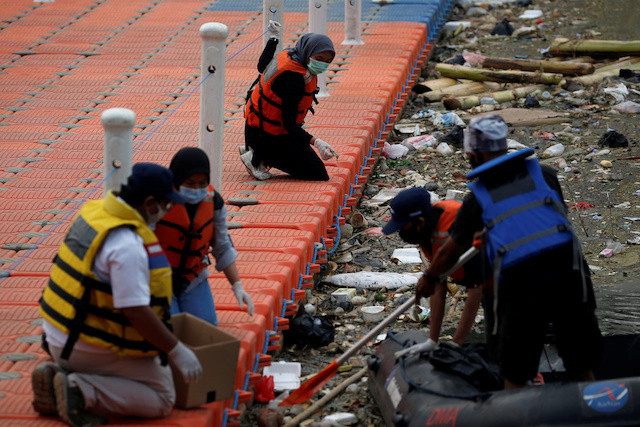Popular Reads
Top Results
Can't find what you're looking for?
View all search resultsPopular Reads
Top Results
Can't find what you're looking for?
View all search resultsIncreasing amounts of medical waste found in Cisadane River
Increasing amounts of medical waste are found in the Cisadane River as concern grows around the world about face masks and other plastic-containing equipment that will stay around for decades or centuries.
Change text size
Gift Premium Articles
to Anyone
T
he amount of medical waste found in the Cisadane River has been increasing since the COVID-19 pandemic began, says Tangerang City Environment Agency head Dedi Suhada.
“Our environment activists often find [medical waste] in the Cisadane River that flows through Tangerang,” Dedi said on Wednesday, as quoted by kompas.com.
“Various kinds [of medical waste are found], such as syringes and masks. We are responding to that," he said.
He suspected that the waste came from upstream areas, noting that Tangerang city was the fourth jurisdiction Cisadane waters pass through. The 126-kilometer river flows through four regions of two provinces, namely Bogor regency in West Java and South Tangerang city, Tangerang regency and Tangerang city in Banten.
Dedi added that he had reported the findings to the Environment and Forestry Ministry and that the ministry would look into the matter.
“We have coordinated with the [ministry] and conducted an observation. Let’s wait for the results,” said Dedi. He expressed hope that the people throwing medical waste into the river would be revealed soon.
Dedi also said he hoped that all stakeholders in the regions traversed by the Cisadane River would pay attention to the issue. “We hope that all stakeholders in the four regions share the same concern on this issue and will be responsible,” he said.
Previously, Reuters reported that, according to the Health Ministry 1,480 tons of COVID-19 medical waste was produced across the country from March through June – and the ministry admitted the country lacked treatment facilities but was working on solutions.
Read also: /news/2020/09/01/in-indonesia-coronavirus-floods-cisadane-river-with-extra-hazard-medical-waste.html" target="_blank"> In Indonesia, coronavirus floods Cisadane River with extra hazard: Medical waste
"A new regulation has just passed that includes guidelines around medical waste treatment in every health facility," said ministry official Imran Agus Nurali.
Most health facilities in Indonesia, including hospitals, currently rely on third parties to incinerate their waste.
Despite millions of people being told to use face masks, little guidance has been given on how to dispose of or recycle them safely. And as countries begin to lift mobility restrictions, billions of masks will be needed each month globally. Without better disposal practices, an environmental disaster is looming, the Conversation reported in August.
The majority of masks are manufactured from long-lasting plastic materials, and if discarded can persist in the environment for decades to hundreds of years.
In March, the World Health Organization estimated that 89 million additional disposable masks were needed globally per month in medical settings to combat COVID-19. (aly)
Editor’s note: This article is part of a public campaign by the COVID-19 task force to raise people’s awareness about the pandemic.










